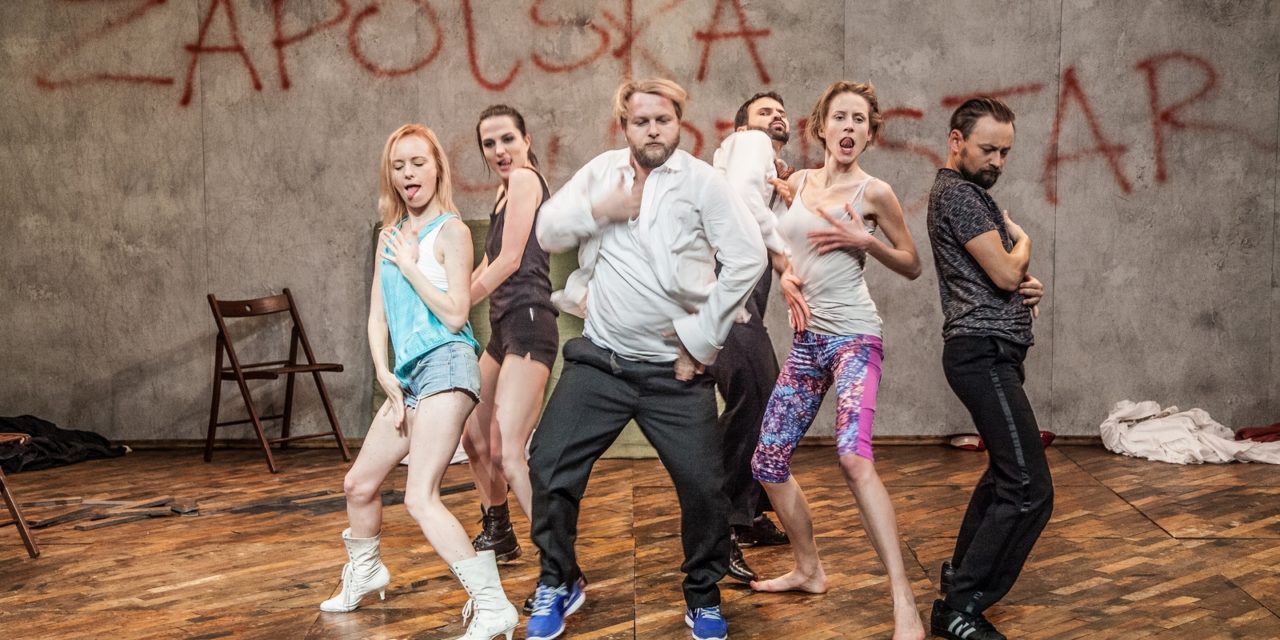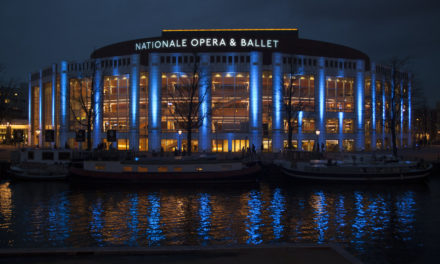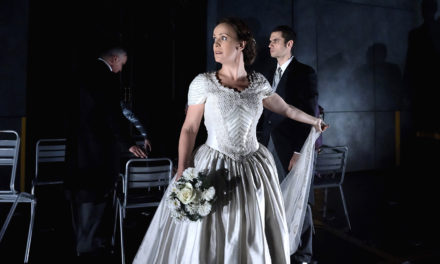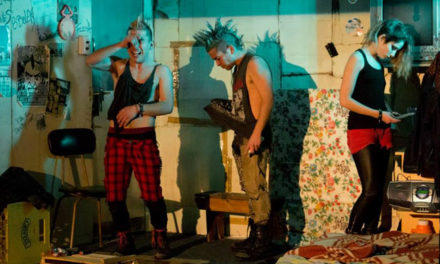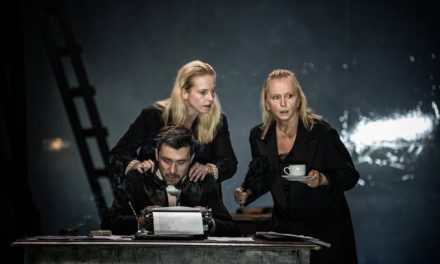The 2016/17 theatrical season in Poland is about to end and most of the theatres will close for July and August. The second half of the season always features several festivals that celebrate theatre works of the past months. The review below does not attempt to provide details of all the festivals. If one was to count every theatre festival in Poland, including fringe, opera, and ballet festivals, one would end up with over 900 events that happen annually or biannually… The paragraphs below simply offer a summary of the most prominent festivals.
38TH STAGE SONGS REVIEW, 24 MARCH – 2 APRIL 2017 WROCŁAW
This is one of Poland’s oldest and most prestigious theatre festivals focused entirely on the art of singing in theatre. Every year it invites the most renowned international artists. Through concerts, performances, and other events, they explore how theatre, music, and words support and interrogate each other. In the past, it featured artists like Camille O’Sullivan (2009), Nick Cave (1999), Laurie Anderson (2005), or Shefita (2017). The key part of the festival is the Gala Concert and the Contest of Songs Interpretation. This year both were highly political. The winner of the contest was Marcin Januszkiewicz; one of his two songs was the national anthem of Poland. The audience award went to Karolina Micuła who sung the 1988 song by Kult Arahja.
The Gala Concert had a title Museum of Freedom and was prepared by one of the boldest Polish political cabaret Pożar w Burdelu (Fire in the Brothel). The Gala, performed at the Polski Theatre in Wrocław, was larded with political allusions and featured Marta Zięba (one of the ex-actors from the Polski Theatre) reading the list of people involved in and punished for the protest against Krzysztof Mieszkowski’s regime (we wrote about this theatre before). The Gala was so well received that Pożar w Burdelu will perform it again in Warsaw in September.
42ND THEATRICAL CONFRONTATION “POLISH CLASSICS”, 18-23 APRIL 2017, OPOLE
The festival invites and awards the most innovative and accomplished productions of classical Polish texts. This year the winner was Anna Augustynowicz’s staging of Ślub [The Marriage] by Witold Gombrowicz that received prizes for production, directing, and several acting awards. The latter included one for the lead part (for Grzegorz Falkowski) and the debut one for Jędrzej Wielecki. Ślub is a co-production of the Współczesny Theatre in Szczecin and the Kochanowski Theatre in Opole. Jakub Roszkowski received a special award for his search for new forms and exploring borders between puppetry and dramatic theatres in the Andersen Theatre’s (Lublin) production of Stanisław Wyspiański’s Wesele [The Wedding] and an adaptation of Henryk Sienkiewicz’s Krzyżacy [Teutonic Knights] produced by the Miniatura Theatre from Gdańsk.
52ND REVIEW OF SMALL FORMS THEATRES KONTRAPUNKT, 21-28 APRIL, SZCZECIN
The festival happens annually in border city Szczecin (previously a German city) and looks at the new trends in Polish theatre. Kontrapunkt translates into English as a counterpoint. The productions must neither be longer than 90-minutes nor feature more than six actors. Kontrapunkt brings together recognized and emerging artists with diverse audiences through its three key strands: main, fringe, and theatre for young audiences. In the past few years, at least one day of the festival happens in Germany. This year it was Bröllin and Berlin. The Jury of experts decides on the prizes, but it is the audience that awards the Grand Prix.
In 2017, the Jury selected Punkt zero: Łaskawe [Point Zero: the Kindly Ones] by Provisorium Theatre and adapted and directed by Janusz Opryński. The production explores the figure of Max Aue, a Nazi hugely involved in the Holocaust and is based on Jonathan Littell’s novel Les Bienveillantes [The Kindly Ones]. The audience chose the Wałbrzych Dramatyczny Theatre and their Zapolska superstar directed by a young director Aneta Groszyńska and dramaturged by Jan Czapliński. The Wałbrzych ensemble also won the acting award. Gabriela Zapolska was a Polish playwright known for its comedies about Polish bourgeois. Zapolska superstar explores the story of Zapolska as a woman who decided to have her own opinion at the turn of the nineteenth and twentieth century. Adam Ziajski received the Zygmunt Duczyński Award for Artistic Individualism for Nie mów nikomu [Don’t tell anyone], the production created with death actors. In Nie mów nikomu (produced by Scena Robocza in Poznań) actors and spectators co-create sign language.
28TH FESTIVAL OF POLISH PUPPETRY THEATRES, 6-12 MAY 2017, OPOLE
This is the oldest and most prestigious puppetry festival in Poland. In 2017, the organizers selected eleven productions to take part in the main competition; the festival also featured several accompanying events. The latter included pieces prepared by students of puppetry departments in Polish drama schools. The eleven shows were diverse in form and content and aimed at both young audiences and adults.
The 2017 Jury awarded the main prize to Jakub Roszkowski’s staging of Henryk Sienkiewicz’s Krzyżacy [Teutonic Knights] from the Miniatura Theatre from Gdańsk. This was another award for the young director. The main acting award went to Bogusław Kierc for his role of the Poet in Adam Mickiewicz’s Dziady [Forefathers’ Eve] directed by Paweł Passini for the Opole Puppet and Actor Theatre. The Jury also acknowledged the achievements of scenographer Ewa Woźniak in Kolorowi Ludzie [Colourful People], directed by Honorata Mierzejewska-Mikosza for the Opole Puppet and Actor Theatre.
35TH DRAMA SCHOOLS FESTIVAL, 8-14 MAY 2017, ŁÓDŹ
In the current author’s opinion, this is one of the most exciting Polish theatre festivals. It brings together final shows from all Polish drama schools. The festival is an opportunity for the final year students to showcase their talents to the industry, but also to celebrate their achievements. After all, getting to and surviving four years in a Polish drama school is an achievement.
The actors are judged by professionals, journalist, and public figures with several awards available. The most prestigious one, Grand Prix is awarded by the Jury of experts and this year it went to the ensemble (which is unusual) starring in Do Dna [Bottoms Up]: Dominika Guzek, Weronika Kowalska, Agnieszka Kościelniak, Jan Marczewski, and Łukasz Szczepanowski. Do Dna was a diploma of the vocal pathway at the Ludwik Solski State Drama School prepared by Ewa Kaim. The production was based on Polish folk songs.
57TH KALISZ THEATRE ENCOUNTERS: ART OF ACTING FESTIVAL, 13-21 MAY 2017, KALISZ
While the trainee actors celebrate in Łódź, Kaliskie Spotkania Teatralne [Kalisz Theatre Encounters] focuses entirely on their senior peers. This is the oldest theatre festival in Poland and the only one focused entirely on the art of acting; it searches for new forms and directions in acting. The 2017 Grand Prix went to the ensemble from Łaźnia Nowa Theatre in Kraków for their work in Wszystko o mojej matce [All About My Mother] directed by Michał Borczuch (another young director). Despite the title, it is not a theatrical adaptation of Pedro Almodóvar’s movie, but a study of a mother’s death contextualised by the fall of communism in Poland.
12TH POLISH CONTEMPORARY PLAYS FESTIVAL R@PORT, 21-27 MAY, GDYNIA
![“Żony stanu, dziwki rewolucji, a może i uczone białogłowy” [Stateswomen, Sluts of Revolution, or the Learned Ladies] by Jolanta Janiczak, directed by Wiktor Rubin, Polski Theatre in Bydgoszcz, Photo by Monika Stolarska.](https://thetheatretimes.com/wp-content/uploads/2017/06/Zony-stanu-5_2500-fot.-Monika-Stolarska-1-1024x684.jpg)
“Żony stanu, dziwki rewolucji, a może i uczone białogłowy” [Stateswomen, Sluts of Revolution, or the Learned Ladies] by Jolanta Janiczak, directed by Wiktor Rubin, Polski Theatre in Bydgoszcz, Photo by Monika Stolarska.
The Jury awards the Grand Prix; this year it went to the Polski Theatre in Bydgoszcz for their staging of Jolanta Janiczak’s Żony stanu, dziwki rewolucji, a może i uczone białogłowy [Stateswomen, Sluts of Revolution, or the Learned Ladies] directed by Wiktor Rubin. The audience chose to award Paweł Demirski’s Triumf woli [The Triumph of Will], directed by his creative partner Monika Strzępka for the Stary Theatre in Kraków. The Gdynia Dramatic Award went to Magdalena Drab for Słabi. Ilustrowany banał teatralny [The Weak Ones. An Illustrated and Theatrical Cliché]. Szymon Spichalski and Agata Tomasiewicz received the awards for the best reviews.
17TH TWO THEATRES: FESTIVAL OF POLISH RADIO THEATRE AND TELEVISION THEATRE
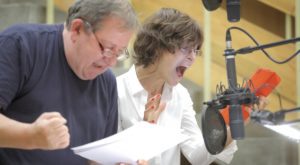
Mariusz Benoit and Danuta Stenka performing in radio drama Lilla Weneda by Juliusz Słowacki, directed by Dariusz Błaszczyk. Polish National Radio. Photo by Grzegorz Śledź.
Dwa Teatry [Two Theatres] celebrates the best works of Television Theatre (a weekly programme on Polish National TV that runs, with short breaks, since 1953) and best radio drama created by the Polish National Radio. The Grand Prix went this year to a radio show based on Juliusz Słowacki’s Lilla Weneda. This verse drama was directed by Dariusz Błaszczyk. Posprzątane [The Clean House] by American playwright Sarah Rhuhl and directed for Polish TV by Agnieszka Lipiec-Wróblewska received the other Grand Prix. The audience selected TV production Listy z Rosji [Letters from Russia] directed by Wawrzyniec Kostrzewski and a radio drama Nie jestem wielbłądem [I Am Not a Camel] written and directed by Marcin Troński. Ewa Dałkowska and Olgierd Łukaszewicz received prizes for eminent acting roles. The best radio drama for young audiences was Labirynt [Labyrinth] by Grzegorz Kasdepke and directed by Waldemar Modestowicz.
As this piece is being written, the International Festival of Puppetry Theatre for Adults “Metamorfozy LALEK” in Białystok is still ongoing. The 2017 edition features artists from Spain, Poland, France, Lithuania, Hungary, Belarus, Greece, Belgium, Ukraine, USA, Bulgaria, Netherlands, Czech Republic, and Germany. The unique feature of the festival is that tickets for all the shows are free.
![“Dzień osiemdziesiąty piąty” [Day Eighty Five] from the Wałbrzych Puppet and Actor Theatre is one of the productions presented at the “Metamorfozy Lalek” Festival. Based on The Old Man and the Sea by Ernest Hemingway, directed by Aga Błaszczak, scenography by Joanna Kubik, cast: Paweł Kuźma and Jakub Grzybek. Photo by the Wałbrzych Puppet and Actor Theatre.](https://thetheatretimes.com/wp-content/uploads/2017/06/Dzień-osiemdziesiąty-piąty-26-1024x683.jpg)
Dzień osiemdziesiąty piąty [Day Eighty Five] from the Wałbrzych Puppet and Actor Theatre is one of the productions presented at the “Metamorfozy Lalek” Festival. Based on The Old Man and the Sea by Ernest Hemingway, directed by Aga Błaszczak, scenography by Joanna Kubik, cast: Paweł Kuźma and Jakub Grzybek. Photo by the Wałbrzych Puppet and Actor Theatre.
At all the festivals mentioned here, several other awards were received. This review, for the practical reasons, cannot name all artists. One can, however, congratulate and thank them all!
This post was written by the author in their personal capacity.The opinions expressed in this article are the author’s own and do not reflect the view of The Theatre Times, their staff or collaborators.
This post was written by Kasia Lech.
The views expressed here belong to the author and do not necessarily reflect our views and opinions.

